Analytics engineering interviews can be challenging, and many qualified candidates fail not because they lack technical skills, but because they make avoidable mistakes during the interview process. The most common analytics engineering interview mistakes include inadequate preparation, poor communication of technical concepts, and failing to demonstrate both analytical thinking and collaboration skills effectively. These errors often prevent talented professionals from landing roles that match their actual capabilities.
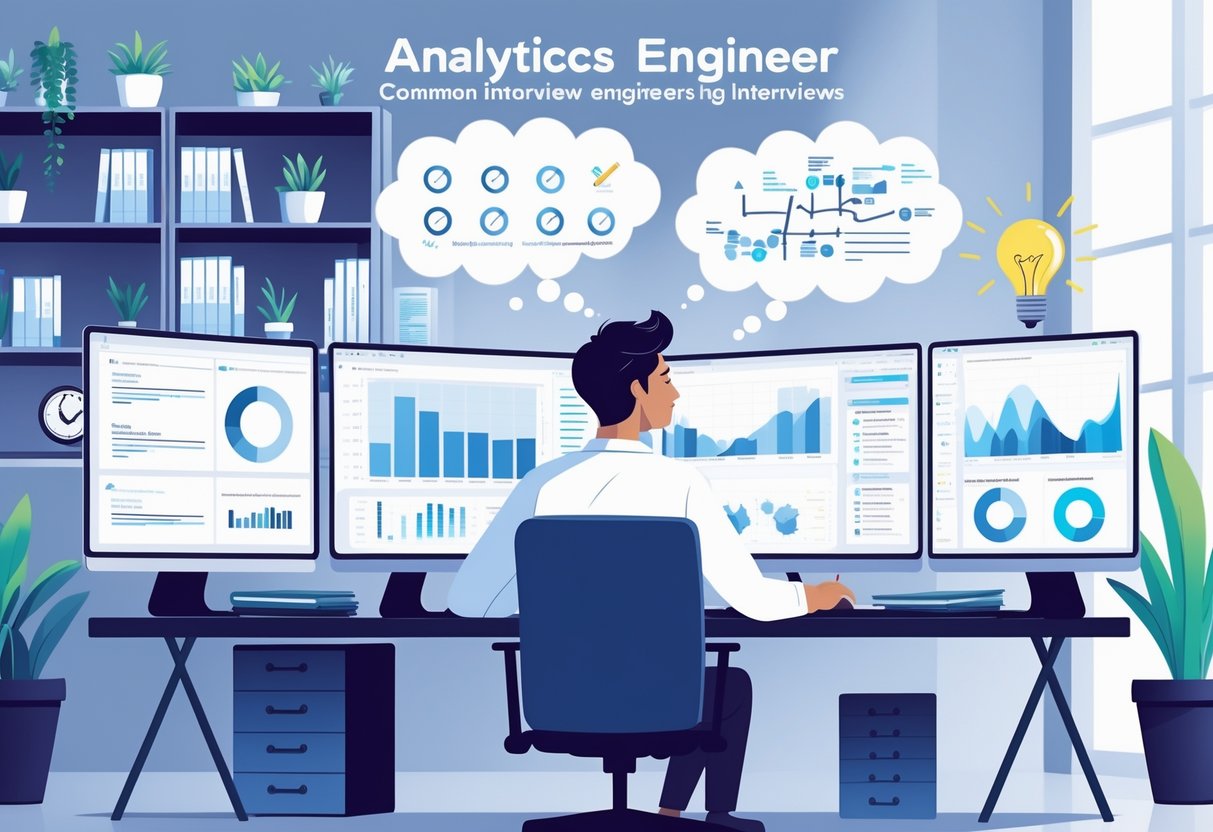
Understanding what interviewers look for helps candidates position themselves for success. Analytics engineering interviews typically involve multiple stages including technical assessments, stakeholder conversations, and system design discussions. Each stage presents unique opportunities for mistakes that can derail an otherwise strong candidacy.
The key to interview success lies in recognizing these potential pitfalls before they happen. By addressing common technical gaps, improving communication strategies, and developing better time management skills, candidates can significantly increase their chances of securing their target analytics engineering position.
Key Takeaways
- Most analytics engineering interview failures stem from poor preparation and weak technical communication rather than lack of skills
- Successful candidates balance technical expertise with strong collaboration abilities and analytical reasoning during interviews
- Avoiding common mistakes like rushing through problems and neglecting code review dramatically improves interview performance
Key Analytics Engineering Interview Mistakes

Many candidates fail analytics engineering interviews due to preventable errors in their problem-solving approach. The most critical mistakes involve rushing into solutions without proper analysis, missing important edge cases, and creating unnecessarily complex implementations.
Inadequate Problem Analysis
Candidates often jump straight into coding without fully understanding the business context or data requirements. This leads to solutions that miss the mark entirely.
Reading the problem too quickly causes major issues. Many candidates scan the question and start writing SQL immediately. They miss key details about data relationships or business logic.
Failing to ask clarifying questions during live-coding interviews shows poor analytical thinking. Interviewers purposely leave out details to test this skill.
Not identifying data quality issues upfront creates problems later. Smart candidates discuss potential data inconsistencies before building their solution.
The best approach involves:
- Reading the problem multiple times
- Asking about data sources and quality
- Clarifying business rules
- Sketching the solution before coding
Thinking out loud helps interviewers follow your logic. Many candidates are internal thinkers but need to verbalize their process during interviews.
Neglecting Edge Cases
Analytics engineers must handle unusual data scenarios that break typical assumptions. Missing these cases shows lack of real-world experience.
Null values and missing data trip up many candidates. They write queries that work with clean sample data but fail with realistic datasets containing gaps.
Duplicate records often exist in business systems. Candidates who don’t account for this create incorrect aggregations and metrics.
Date edge cases include leap years, timezone changes, and business vs calendar years. These details matter for accurate reporting.
Common edge cases to consider:
- Zero or negative values in metrics
- Empty result sets from joins
- Data type mismatches between tables
- Historical data changes over time
Testing with realistic data reveals these issues. Candidates should walk through their solution with different scenarios, not just the happy path.
Overcomplicating Solutions
Simple, readable code beats complex implementations in analytics engineering interviews. Candidates often try to show off advanced techniques inappropriately.
Writing overly complex SQL with nested subqueries makes code hard to follow. Using CTEs and clear naming creates better solutions.
Premature optimization wastes valuable interview time. Getting a working solution first, then improving performance, demonstrates better priorities.
Using unnecessary tools or frameworks for simple problems shows poor judgment. Sometimes a straightforward SQL query beats a complex data pipeline.
Poor code organization includes:
- Missing comments and documentation
- Inconsistent formatting and indentation
- Unclear variable names
- No logical structure
The technical interview process values clarity over complexity. Interviewers need to understand your thinking process quickly.
Explaining your approach before coding helps avoid overengineering. Discussing the simplest solution first shows good analytical judgment.
Insufficient Preparation Strategies

Poor preparation remains one of the biggest mistakes candidates make during technical interviews. Candidates often underestimate the time needed for coding practice, skip essential platforms, and avoid realistic interview simulations.
Lack of Technical Interview Practice
Many candidates assume their daily work experience translates directly to interview success. This approach fails because technical interviews test specific problem-solving skills under time pressure.
Regular practice schedules make the biggest difference. Candidates should dedicate 1-2 hours daily to coding problems for at least 4-6 weeks before interviews.
The most effective practice targets these core areas:
- Data structures (arrays, linked lists, trees, graphs)
- Algorithms (sorting, searching, dynamic programming)
- System design fundamentals
- Time and space complexity analysis
Candidates who practice consistently perform 40% better than those who cram. They develop pattern recognition skills that help them identify solution approaches quickly.
Problem-solving under pressure requires specific training. Interview conditions create stress that affects logical thinking. Regular timed practice sessions help candidates maintain clarity during actual interviews.
Ignoring Coding Platforms
Candidates often stick to familiar development environments instead of using interview-focused platforms. This creates a significant disadvantage during actual interviews.
LeetCode provides the most comprehensive interview preparation. The platform offers over 2,000 problems categorized by difficulty and company. Candidates should complete at least 150-200 problems across all difficulty levels.
HackerRank excels at testing specific programming concepts. The platform’s structured approach helps candidates identify weak areas. Many companies use HackerRank for initial screening rounds.
Platform-specific benefits include:
- LeetCode: Company-specific question lists, discussion forums, optimal solutions
- HackerRank: Skill assessments, certification programs, timed challenges
- CodeSignal: Real interview simulations, detailed performance analytics
Candidates should practice on whiteboards and basic text editors too. Some interviews restrict advanced IDE features, making platform diversity essential.
Underestimating Mock Interviews
Most candidates skip mock interviews entirely or treat them casually. This mistake costs them valuable feedback and realistic practice opportunities.
Live mock interviews reveal communication gaps that solo practice cannot address. Candidates must explain their thought process while coding, which requires specific skills.
Effective mock interview strategies include:
- Peer practice: Exchange sessions with other candidates
- Professional services: Paid platforms with experienced interviewers
- Recording sessions: Review performance and identify improvement areas
Mock interviews help candidates become accustomed to articulating their thought process under observation. This skill often determines interview success more than coding ability alone.
Candidates should complete 5-10 mock interviews before their actual interviews. Each session should mirror real interview conditions with time limits and unfamiliar problems.
Weak Understanding of Technical Concepts

Insufficient technical preparation remains one of the primary reasons candidates struggle in analytics engineering interviews. Many applicants underestimate the depth of algorithms knowledge and data structures understanding required for these roles.
Gaps in Algorithms Knowledge
Analytics engineering interviews frequently test sorting, searching, and optimization algorithms that directly apply to data processing workflows. Candidates often struggle with Big O notation and fail to explain time complexity trade-offs.
Common algorithm gaps include:
- Sorting algorithms: Quick sort, merge sort, and heap sort applications in data pipelines
- Graph algorithms: Used for dependency resolution and data lineage tracking
- Dynamic programming: Essential for optimization problems in resource allocation
Interviewers assess whether candidates can select appropriate algorithms for specific data processing scenarios. They expect explanations of why certain algorithms perform better with large datasets or memory-constrained environments.
Candidates should practice implementing core algorithms from scratch. They must articulate the reasoning behind algorithm selection rather than memorizing code patterns.
Poor Grasp of Data Structures
Analytics engineers work extensively with hash tables, trees, and graph structures when designing data transformation pipelines. Technical interview failures often stem from inadequate data structure knowledge.
Critical data structures include:
- Hash maps: For fast lookups in data joining operations
- Binary trees: Used in indexing and hierarchical data representation
- Graphs: Essential for modeling data relationships and dependencies
Candidates frequently cannot explain when to use arrays versus linked lists for different data processing tasks. They struggle to design efficient storage solutions for time-series data or dimensional models.
Successful candidates demonstrate how data structure choices impact query performance and memory usage. They connect theoretical concepts to practical analytics engineering challenges like data warehouse design and ETL optimization.
Failing to Address System Design and Scalability
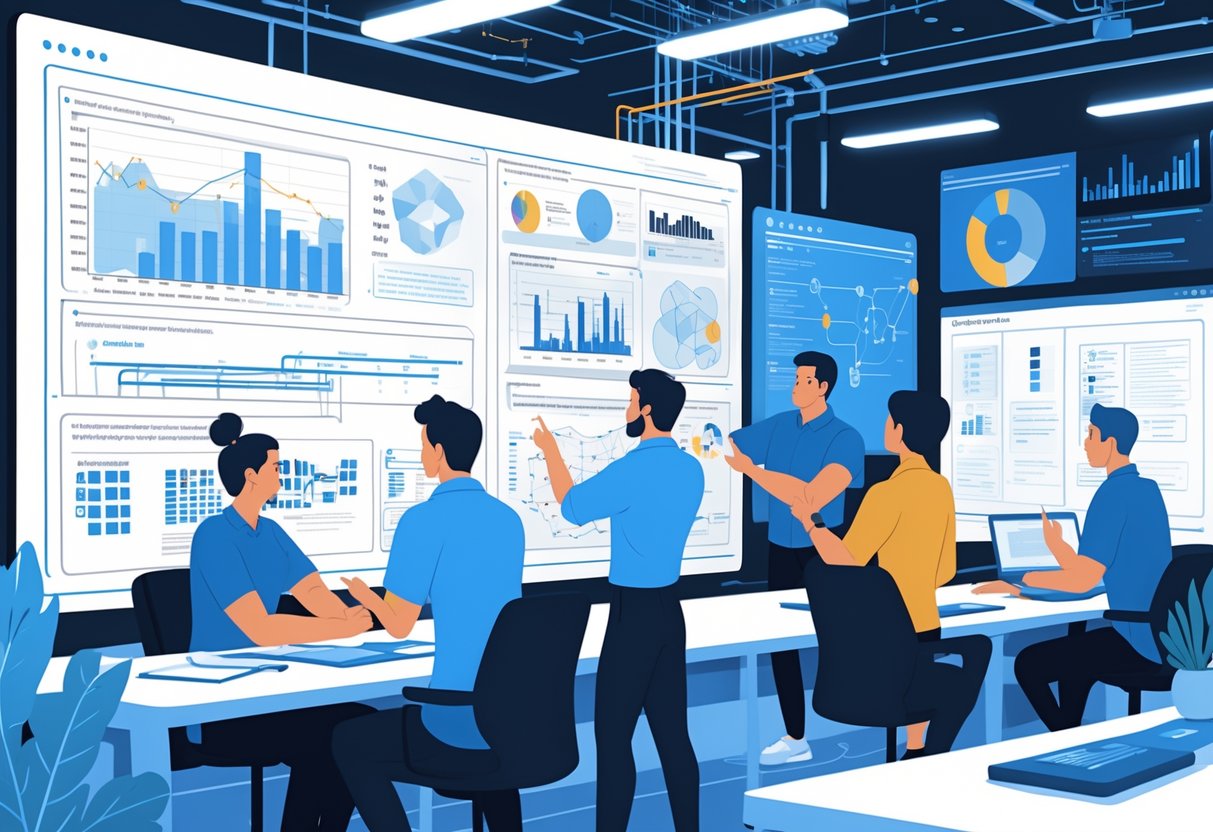
Analytics engineering candidates often struggle when interviewers ask about building systems that handle growing data volumes and user demands. Many fail to demonstrate understanding of distributed architectures and performance optimization strategies that separate junior from senior-level practitioners.
Ignoring Scalability Challenges
Analytics engineers frequently underestimate the complexity of scaling data systems beyond initial requirements. They design solutions that work for small datasets but fail when subjected to high traffic or large data volumes.
Common scalability oversights include:
- Assuming single-server solutions will handle production loads
- Ignoring data partitioning strategies for large tables
- Overlooking query performance degradation as datasets grow
- Missing horizontal scaling opportunities in processing pipelines
Candidates should discuss specific scaling techniques during interviews. This includes database sharding, read replicas, and distributed processing frameworks like Spark or Dask.
Performance bottlenecks often emerge at predictable points. Data ingestion may slow during peak hours. Transform jobs might timeout on larger datasets. Dashboard queries could become unusably slow.
Smart candidates anticipate these issues. They propose auto-scaling infrastructure, implement caching layers, and design data models that maintain performance at scale.
Overlooking System Design Principles
Many analytics engineers jump into technical details without establishing proper system architecture foundations. Candidates who start detailing one part of the system without outlining the big picture first create confusion and demonstrate poor planning skills.
Essential system design components for analytics systems include:
| Component | Purpose | Examples |
|---|---|---|
| Ingestion | Data collection and intake | Kafka, Fivetran, APIs |
| Processing | Transformation and computation | dbt, Spark, Dataflow |
| Storage | Data persistence and retrieval | Snowflake, BigQuery, S3 |
| Consumption | User access and visualization | Tableau, Looker, APIs |
Candidates should explain how data flows between these layers. They need to justify technology choices based on specific requirements like latency, consistency, and cost.
Modular thinking separates strong candidates from weak ones. Instead of proposing monolithic solutions, they break problems into manageable pieces that can be developed and scaled independently.
Ineffective Communication and Collaboration

Analytics engineers must demonstrate strong communication skills during interviews, as their role requires constant collaboration with data teams, stakeholders, and business users. Poor communication habits can immediately signal to interviewers that a candidate may struggle in team environments or fail to translate technical concepts effectively.
Silent Coding Pitfalls
Many analytics engineering candidates make the mistake of coding in complete silence during technical assessments. This approach prevents interviewers from understanding the candidate’s problem-solving process and thought patterns.
Silent coding creates several problems. Interviewers cannot assess how candidates approach complex data problems or handle unexpected challenges. They also miss opportunities to evaluate the candidate’s ability to explain technical decisions to non-technical stakeholders.
Candidates should narrate their coding process step by step. They need to explain why they choose specific SQL functions, data modeling approaches, or transformation logic. This demonstrates both technical knowledge and communication abilities.
Key communication strategies include:
- Describing the problem before writing code
- Explaining each major step aloud
- Mentioning alternative approaches considered
- Discussing trade-offs between different solutions
When candidates encounter errors or unexpected results, they should verbalize their debugging process. This shows problem-solving skills and helps interviewers understand their analytical thinking.
Lack of Clear Thought Articulation
Analytics engineers often struggle to articulate their thought processes while solving problems, which creates confusion for interviewers trying to assess their capabilities.
Unclear explanations typically stem from jumping between ideas without logical structure. Candidates might discuss data quality issues, then switch to performance optimization, then mention business requirements without connecting these concepts coherently.
Effective thought articulation requires organizing ideas before speaking. Candidates should structure their responses using frameworks like problem identification, solution approach, implementation details, and expected outcomes.
Clear communication techniques:
- Start with the business context
- Define technical requirements clearly
- Explain methodology step by step
- Connect technical decisions to business impact
Candidates must also adapt their language based on the interviewer’s background. Technical explanations for engineering managers should differ from those given to data scientists or business stakeholders.
Poor Response to Interviewer Feedback
How candidates handle feedback during interviews reveals their collaboration skills and ability to work effectively in team environments. Many analytics engineers become defensive or ignore suggestions entirely.
Poor feedback responses include arguing with interviewers, dismissing alternative approaches, or failing to incorporate suggestions into their solutions. These behaviors suggest difficulty working with colleagues and stakeholders.
Strong candidates acknowledge feedback positively and demonstrate flexibility in their thinking. They ask clarifying questions to better understand suggestions and show willingness to modify their approaches.
Effective feedback responses:
- Thank the interviewer for input
- Ask follow-up questions for clarity
- Integrate suggestions into current work
- Explain how feedback improves the solution
Candidates should view feedback as collaborative problem-solving rather than criticism. This mindset demonstrates the soft skills necessary for successful analytics engineering roles, where iteration and refinement are constant requirements.
When receiving technical corrections, candidates should acknowledge mistakes gracefully and show how they would prevent similar issues in production environments.
Poor Time Management During Interviews
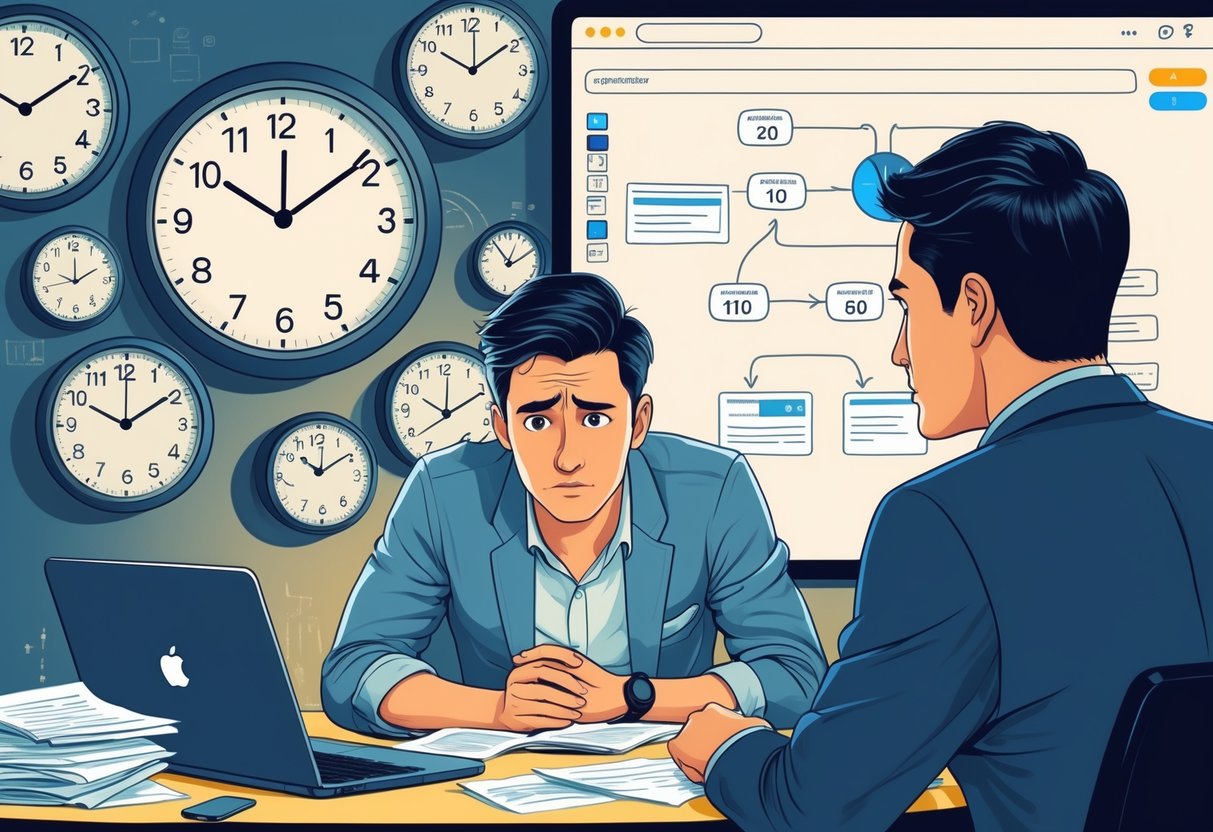
Analytics engineering candidates often struggle with allocating their time effectively across different interview components. They may spend excessive time on one coding problem while neglecting other important tasks like explaining their thought process or discussing system design considerations.
Spending Too Long on a Single Problem
Many candidates become fixated on solving a complex SQL query or data modeling challenge perfectly. This tunnel vision causes them to use 45 minutes on a problem that should take 20 minutes.
Analytics engineering interviews typically include multiple components. Candidates need time for technical problems, behavioral questions, and discussions about data architecture. Setting clear objectives helps candidates stay focused during the interview process.
Time allocation mistakes include:
- Debugging a single query for 30+ minutes
- Overengineering a data pipeline solution
- Getting stuck on edge cases instead of showing core logic
- Perfectizing dashboard mockups rather than explaining the approach
Smart candidates ask clarifying questions upfront. They outline their solution approach before coding. When they hit roadblocks after 15-20 minutes, they explain their thinking and move forward rather than staying stuck.
Failing to Prioritize Tasks
Analytics engineering interviews often present multiple interconnected problems. Candidates may tackle data quality checks before establishing the basic ETL framework. This backwards approach wastes valuable time.
Effective prioritization means addressing core functionality first. Candidates should build a working data pipeline before optimizing performance. They need to demonstrate basic SQL competency before attempting advanced window functions.
Priority framework for analytics problems:
- Data ingestion – Show how raw data enters the system
- Core transformations – Essential business logic and calculations
- Data quality – Basic validation and error handling
- Performance optimization – Indexing, partitioning, caching strategies
Technical interview preparation requires understanding which concepts matter most. Candidates who jump to advanced topics without covering fundamentals appear unprepared.
Interviewers want to see logical thinking progression. They value candidates who can identify the most critical components of a data system and address them systematically.
Neglecting to Review and Test Code
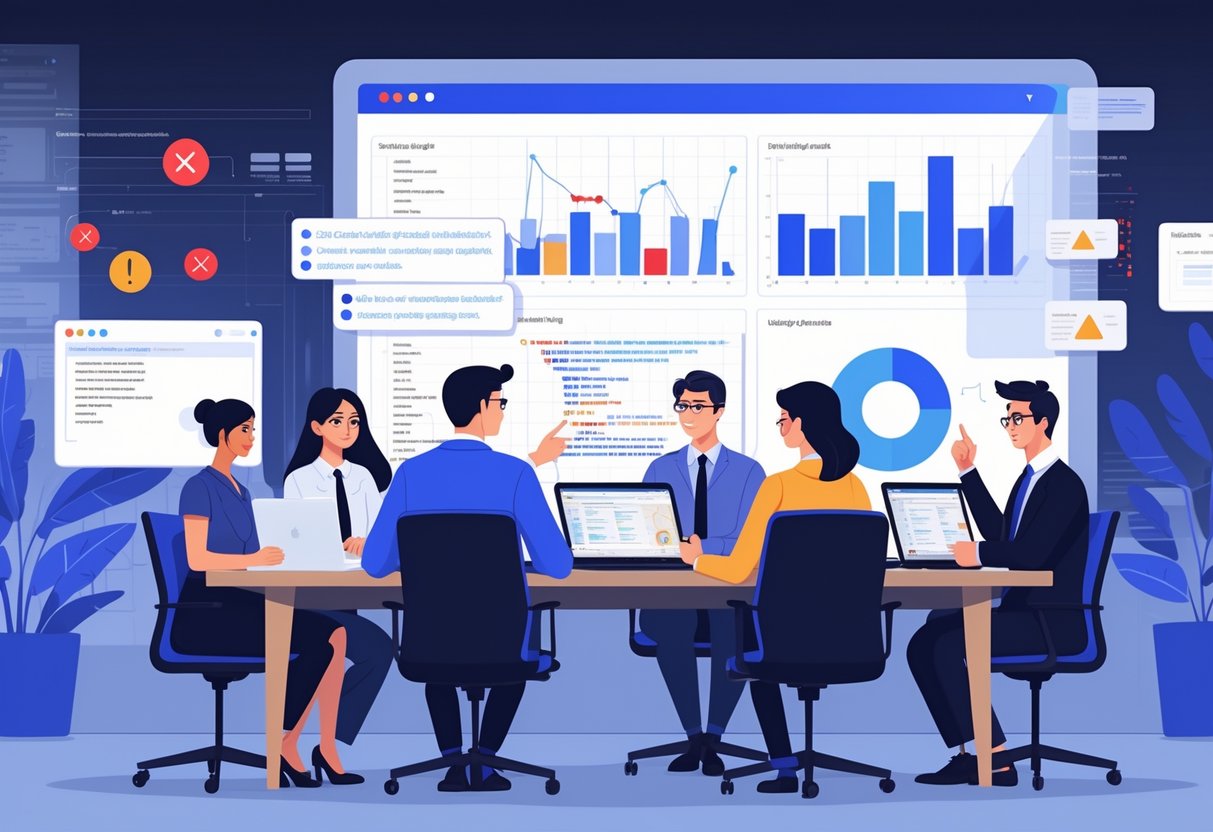
Many analytics engineers rush through their solutions without properly checking their work or testing different scenarios. This oversight can lead to bugs, poor performance, and missed opportunities to show attention to detail during interviews.
Skipping Code Review Processes
Analytics engineers often submit their code immediately after writing it without taking time to review. This creates problems that could easily be caught with a quick check.
Common review mistakes include:
- Not checking variable names for clarity
- Missing syntax errors or typos
- Forgetting to remove debug print statements
- Using inconsistent formatting styles
Smart candidates allocate the last 5-10 minutes of their interview for code review. They read through their solution line by line, looking for obvious errors.
They also check if their variable names make sense to someone else reading the code. Names like df1 and temp_var should be changed to customer_orders and monthly_revenue.
The review process helps catch simple mistakes that can be overlooked when focused on solving the main problem.
Missing Test Coverage for Edge Cases
Many analytics engineers only test their code with the happy path scenario. They forget to check what happens when data is missing, empty, or unusual.
Critical edge cases to test:
- Empty datasets or null values
- Single row datasets
- Datasets with duplicate records
- Extreme values (very large or very small numbers)
For example, if writing a function to calculate average order value, they should test with zero orders, one order, and orders with null amounts.
Analytics engineers should walk through their code mentally with different inputs. They can say “What if this table has no rows?” or “What if all values in this column are the same?”
Testing edge cases shows interviewers that the candidate thinks about real-world data problems. Production data is messy, and thorough practice helps avoid common pitfalls in analytics work.
Not Demonstrating Analytical Reasoning

Analytics engineers often fail interviews by not clearly explaining their thought process or skipping crucial efficiency considerations. These gaps prevent interviewers from understanding the candidate’s analytical capabilities and depth of technical knowledge.
Inadequate Explanation of Problem-Solving Approach
Many candidates jump directly into solutions without explaining their reasoning. This lack of communication during technical interviews prevents interviewers from evaluating analytical thinking skills.
Candidates should verbalize each step of their analysis. They need to explain why they chose specific methods, what assumptions they made, and how they validated their approach.
Key elements to communicate:
- Initial problem assessment
- Data exploration strategy
- Methodology selection rationale
- Validation steps planned
The interviewer wants to see structured thinking. Candidates who skip explaining their problem-solving approach appear to lack analytical depth, even when their final solution is correct.
Silent problem-solving creates missed opportunities. Interviewers cannot assess reasoning skills when candidates work quietly and only present final answers.
Overlooking Efficiency Analysis
Analytics engineers frequently ignore performance considerations in their solutions. They focus on getting correct results but fail to discuss computational efficiency or scalability concerns.
Candidates should address time and space complexity. They need to explain how their solution performs with different data sizes and whether optimization opportunities exist.
Efficiency factors to discuss:
- Query performance implications
- Memory usage considerations
- Scalability with larger datasets
- Alternative approaches for better performance
Interviewers expect candidates to think beyond basic functionality. They want to see awareness of real-world constraints like processing time and resource limitations.
Strong candidates compare multiple approaches. They explain trade-offs between different methods and justify their efficiency choices based on specific use cases.
Underestimating the Importance of Soft Skills

Analytics engineers often focus heavily on technical abilities while overlooking crucial interpersonal skills. Strong communication and teamwork capabilities directly impact project success and career advancement in data-driven environments.
Ignoring Teamwork and Communication
Many candidates fail to demonstrate how they collaborate with cross-functional teams during interviews. Analytics engineers work closely with data scientists, business analysts, and stakeholders daily.
Key communication skills include:
- Explaining complex data concepts to non-technical audiences
- Writing clear documentation for data models
- Presenting findings through visualizations
Interviewers assess whether candidates can translate technical work into business value. Those who struggle to articulate their thought process or explain methodologies often get rejected despite strong coding skills.
Technical interview preparation should include practicing explanations of past projects. Candidates must show they can break down complex analytics workflows into understandable steps.
Teamwork examples demonstrate collaboration abilities. Successful candidates discuss specific instances of working with product managers or helping colleagues troubleshoot data issues.
Lack of Adaptability and Openness
Analytics engineering requires constant learning as tools and technologies evolve rapidly. Candidates who appear rigid or resistant to feedback raise red flags for hiring managers.
Adaptability manifests in several ways:
- Learning new technologies quickly when business needs change
- Accepting constructive criticism on code reviews or methodology
- Adjusting approaches based on stakeholder feedback
Soft skills assessment helps employers identify candidates who thrive in dynamic environments. Those who emphasize only their current skill set without showing growth mindset often struggle.
Openness to different perspectives proves crucial when working with diverse teams. Analytics engineers must consider various viewpoints when designing data solutions that serve multiple departments.
Candidates should prepare examples showing how they adapted to changing requirements or learned from mistakes. This demonstrates the flexibility essential for analytics engineering roles.
Strategies to Avoid Analytics Engineering Interview Pitfalls
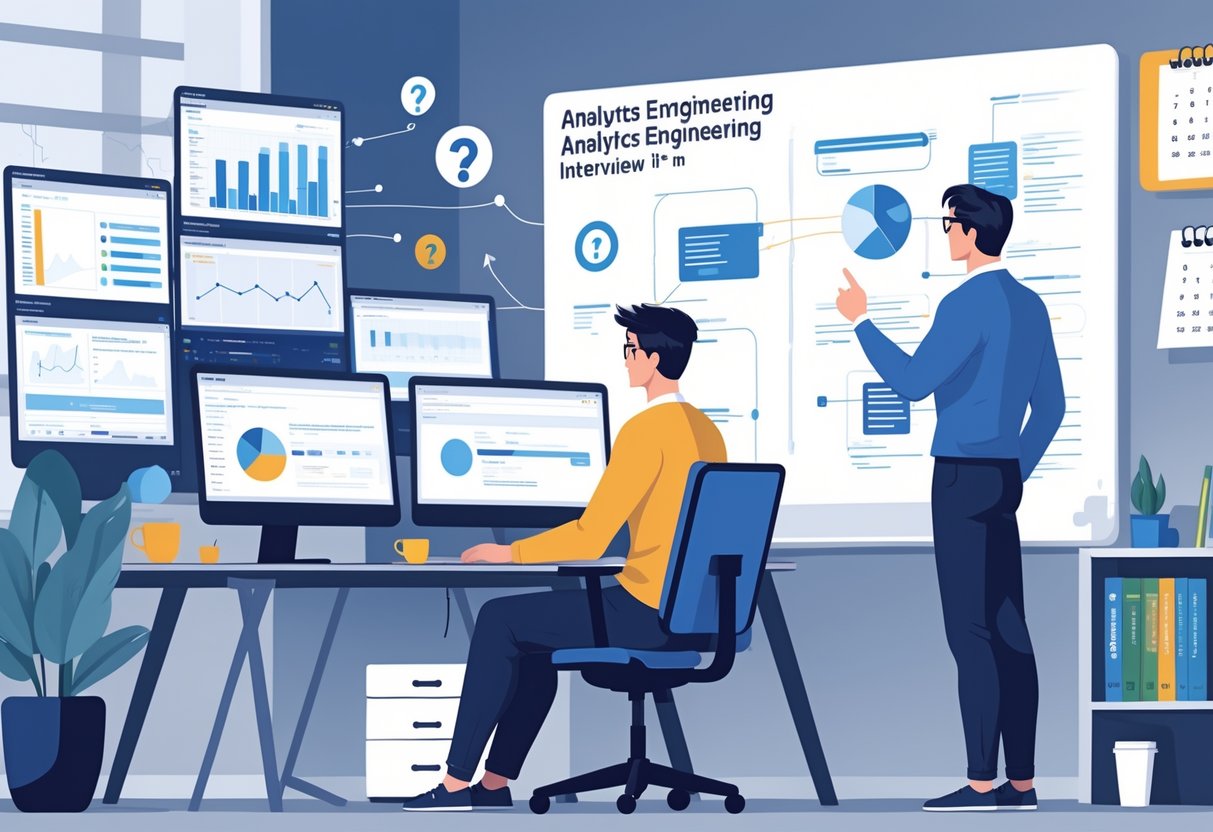
Successful analytics engineering candidates focus on three core areas: deliberate practice with real scenarios, systematic feedback collection, and organized preparation timelines. These approaches transform common weaknesses into competitive advantages.
Implementing Targeted Practice
Candidates should practice SQL queries daily using reputable platforms. Focus on intermediate concepts like window functions and CTEs rather than basic SELECT statements. For hands-on practice and exercises tailored for analytics engineering, explore our practice exercises and quizzes.
Essential Technical Skills to Practice:
- SQL query optimization and performance tuning
- dbt modeling and transformations
- Data pipeline debugging scenarios
- Cross-functional stakeholder communication
Mock technical interviews should simulate real business problems. Practice explaining complex data concepts in simple terms to non-technical audiences.
Set up a GitHub repository with well-documented SQL solutions. This demonstrates organization skills that hiring managers value highly.
Live coding sessions help candidates think out loud effectively. Practice verbalizing thought processes while solving problems under time pressure.
Utilizing Feedback for Growth
Record practice sessions to identify communication gaps and technical weaknesses. Review recordings to spot filler words, unclear explanations, or rushed solutions.
Seek feedback from experienced analytics engineers or data professionals. They can highlight blind spots that self-assessment misses.
Feedback Collection Methods:
- Peer review of take-home assignments
- Technical mentor guidance sessions
- Industry professional networking calls
- Online community code reviews
Document feedback patterns to track improvement areas. Create action plans for addressing recurring issues before technical interview sessions.
Ready to level up your analytics engineering interview skills? Check out our premium projects and games selection for real-world scenarios and interactive learning. For a structured learning path, enroll here.
Structuring Interview Preparation Effectively
Create a 4-week preparation timeline with daily goals and weekly milestones. Dedicate specific days to SQL practice, stakeholder communication, and portfolio development.
Week-by-Week Preparation Structure:
- Week 1: SQL fundamentals and dbt basics
- Week 2: Advanced queries and data modeling
- Week 3: Take-home assignment practice
- Week 4: Mock interviews and final review
Prepare 2-3 detailed project stories using the STAR method. Include specific metrics, challenges faced, and solutions implemented.
Research each company’s data stack thoroughly. Understand their tools, team structure, and recent analytics initiatives before starting your interview preparation.
Organize technical resources in advance. Bookmark documentation, practice problems, and reference materials for quick access during preparation sessions. For hands-on SQL and analytics engineering practice, explore practice exercises, quizzes, and premium projects on Analytics Engineering.
Frequently Asked Questions

Analytics engineering interviews present unique challenges that combine technical SQL skills with business understanding and data modeling expertise. Candidates often struggle with specific technical concepts, live coding scenarios, and demonstrating the soft skills needed for cross-functional collaboration.
What are the most common technical mistakes made during analytics engineering interviews?
Candidates frequently jump into coding without asking clarifying questions about business requirements. This mistake shows poor understanding of how analytics engineers must gather requirements from stakeholders.
Writing inefficient SQL queries ranks as another major error. Many candidates forget to use CTEs or proper indentation, making their code hard to read.
Not explaining their thought process during live coding interviews creates problems. Interviewers want to understand how candidates think through data problems.
Lying about experience with specific tools often backfires when follow-up questions reveal knowledge gaps. Candidates should admit when they don’t know something rather than pretending.
How can one effectively prepare for SQL-based analytics interview questions?
Focus on intermediate concepts like window functions and complex joins.
Reading questions multiple times before writing any code prevents simple mistakes. Interviewers often leave out details on purpose to test if candidates ask the right questions.
Getting to a working solution first matters more than perfect optimization. The pressure of ticking clocks can freeze thought processes, so having something functional beats having nothing.
Using comments and proper formatting shows consideration for code readability. This demonstrates understanding that other team members will need to maintain the code later.
You can also find targeted practice on Analytics Engineering’s exercises and premium projects.
What strategies can help ace scenario-based data quality engineering problems in interviews?
Candidates should start by asking about data sources and potential quality issues. Understanding where data comes from helps identify common problems like duplicates or missing values.
Discussing validation checks and monitoring processes shows depth of knowledge. Talk about how to set up alerts when data quality metrics fall below acceptable thresholds.
Explaining rollback procedures demonstrates practical experience. Interviewers want to know how candidates handle situations when bad data reaches production systems.
Mentioning collaboration with upstream data providers shows business awareness. Data quality often requires working with teams that control source systems.
What are the key concepts in data warehousing that candidates often misunderstand in interviews?
Star schema versus snowflake schema design principles confuse many candidates. They struggle to explain when each approach works best for different business needs.
Dimensional modeling concepts like slowly changing dimensions trip up interviewees. Many cannot clearly describe how to handle changes in customer addresses or product categories over time.
The difference between facts and dimensions seems basic but causes problems. Candidates mix up measures that can be aggregated with descriptive attributes that provide context.
Data lineage and impact analysis concepts get overlooked. Many candidates cannot explain how changes to upstream tables affect downstream reports and dashboards.
For deeper learning, explore Analytics Engineering’s premium projects for real-world data warehousing scenarios.
How does one recover from a coding error or conceptual mistake during a live coding challenge?
Acknowledging the mistake quickly and moving forward shows professionalism. Dwelling on errors wastes precious interview time and creates more stress.
Explaining the correction process demonstrates problem-solving skills. Tell the interviewer how you would debug the issue in a real work environment.
Asking for guidance when stuck shows collaboration skills. Analytics engineers work closely with stakeholders, so seeking help is a valuable trait.
Using the mistake as a learning opportunity impresses interviewers. Explain what you learned and how you would prevent similar issues in the future.
What soft skills are essential for analytics engineers, and how can lacking them affect interview outcomes?
Communication skills top the list because analytics engineers translate between technical and business teams. Poor explanation of technical concepts to non-technical stakeholders signals future collaboration problems. For resources to improve communication in analytics, see Harvard Business Review.
Active listening during requirements gathering shows business awareness. Candidates who interrupt or make assumptions about stakeholder needs raise red flags about their ability to deliver useful solutions. Practicing real-world scenarios can help, such as those found in our analytics engineering exercises.
Prioritization skills become crucial when multiple stakeholders request competing projects. Inability to discuss trade-offs and resource constraints suggests poor project management capabilities. Learn more about prioritization and project management from Project Management Institute.
Empathy for end users affects how candidates approach dashboard design and data presentation. Those who focus only on technical correctness without considering user experience may struggle in the role. You can practice user-focused analytics projects in our premium projects section.

